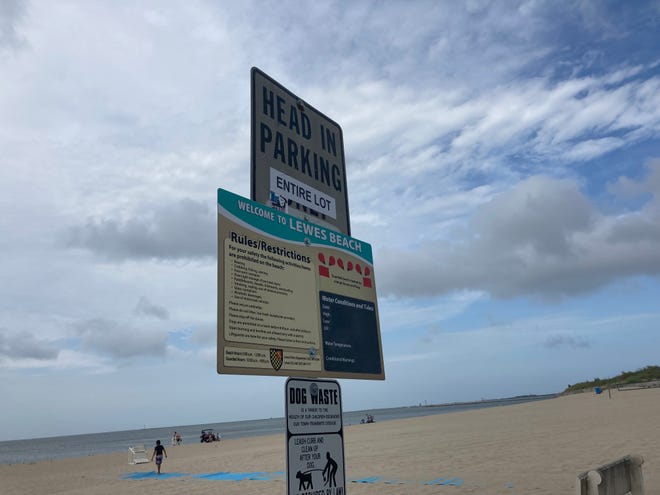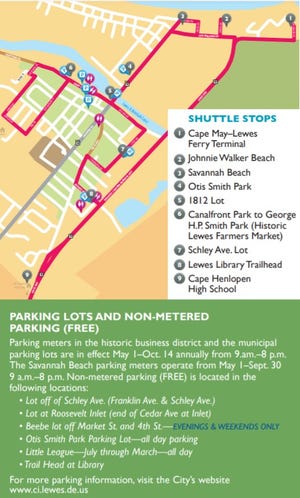With some recent warm February days, it’s easy to drift off into daydreams of summer nights at the beach. Seafood dinners overlooking the canal, walks made more sweet by ice cream cones, or sunset views from the sand.
One thing people are not likely wishing for, though, is that familiar fight for a parking space.
Parking has long been a challenge hovering over Delaware’s small coastal towns, especially as more people visit or move to the surrounding areas.
In Lewes — a town often known for having many full-time and retired residents — this issue of parking has only become more urgent as people have discovered Lewes as a vacation destination or visited from nearby communities, said City Manager Ann Marie Townshend.

“The strain on the available parking gets more significant every year,” Townshend said.
The flow of people and cars is also unique in Lewes because the downtown area is not adjacent to the beach. So, people are often driving to reach various destinations for shopping, dining and beach-going.
PARKING AT THE BEACH:Some big parking changes are coming to Delaware beaches. What that says about tourism
This is one reason that a team of city leaders, including city staff and new Council Members Carolyn Jones and Khalil Saliba, has decided that it is time for a new way to get around Lewes.
“No matter how we look at it we will never have enough parking in the city,” Jones said. “So we need to start looking at it from, ‘how do we move people around?’”
On Monday, Feb. 14, city staff will ask that the council back a decision to lease buses from Delaware Transit Corporation to create the Lewes Line, the city’s first seasonal transit system.

The city will lease five retired paratransit buses from the Delaware Transit Corporation, or DART, for $1 per bus. The goal is to help residents and visitors get around town, including spots like the Cape May-Lewes Ferry, Johnnie Walker Beach, Lewes Beach and the downtown area.
And, of course, reduce the amount of cars adding to the traffic and parking headaches.
REHOBOTH PARKING:Changes are coming for parking in Rehoboth Beach. Here’s what you need to know
The seasonal transit system would be ready by this summer and run daily from Friday, May 27 through the end of September, 9 a.m. to 9 p.m.
Saliba said this new transit system will likely be beneficial for many people living in the Greater Lewes area, but it could also help Lewes residents get to places like the library or parks.
For example, maybe you live in Milton or Long Neck, and you want to visit Lewes for the day. You plan to hit up the beach for an hour or two and then meet some friends at one of the restaurants on Second Street. But you don’t want to go through the hassle of hunting down a parking spot.

So, you head over to Cape Henlopen High School and park there where a shuttle picks you up and drops you off at the beach. Then, when your stomach starts rumbling, you hop on the bus again where it drops you off in downtown Lewes.
Even better? The fare proposed is $1 for a full day of riding — a significant discount from the city’s hourly parking rates in town or at the beach.
This isn’t a brand-new idea. In fact, Lewes has considered some kind of shuttle service for as long as a decade, and the city has looked to other towns like Bethany Beach’s trolley for inspiration, according to Townshend.
But this is probably the closest Lewes has come to establishing its own seasonal transit system, and city officials said it’s largely because of the availability of the Delaware Transit buses.
TAKING THE BUS:This veteran rode a bike and bus for hours from Felton to Wilmington for job training, and it may have changed his life
In the past, plans to set up a shuttle service were often halted by the towering costs. The lease through the state helps the municipality get started, Jones said.
“To get these five buses at a dollar a bus, it doesn’t get better than that,” she said. “It allows us to not put a phenomenal amount of money out there and then figure out what’s going wrong.”
Saliba said the city will ensure that people don’t have to wait a half hour for a bus, and they will adjust as they go if they need to make the routes more efficient. Townshend added that each bus has GPS capabilities, and the city plans to offer an app so people can track the buses.

The cost of setting up Lewes Line, including insurance and hiring drivers, is estimated around $157,000. The projected revenue is $20,000.
While the city plans to support the costs through bus fares and possibly by offering advertising space inside the vehicles, Saliba said, “it’s not designed to be a revenue source for the city. It’s more than anything designed to be a service for our residents as well as visitors.”
Even as the city prepares to welcome Lewes Line, pending the vote on Monday, parking continues to be a focus in the First Town of the First State.
Noticing more people riding bikes in and around the city, council members are now considering adding more bike racks and possibly rentable storage areas for paddleboards and kayaks.
Lewes has also been developing a parking plan to create distinct parking spaces along Lewes Beach and a potential permit program. That plan is still in the works and has received hundreds of public comments since a workshop meeting in mid-January.
Emily Lytle covers Sussex County from the inland towns to the beaches. Got a story she should tell? Contact her at elytle@delmarvanow.com or 302-332-0370. Follow her on Twitter at @emily3lytle.